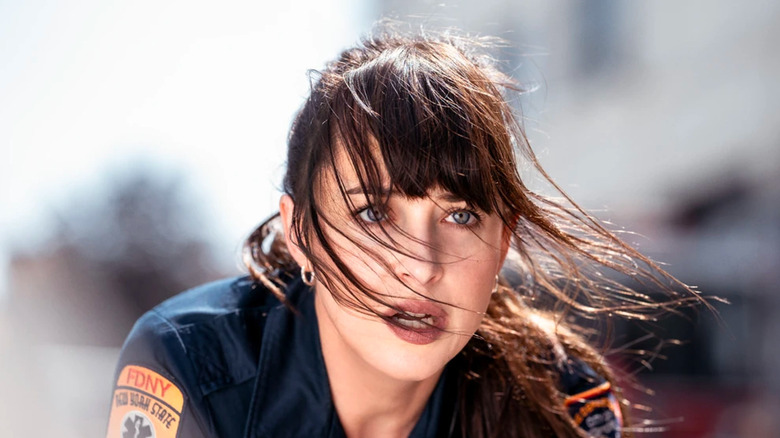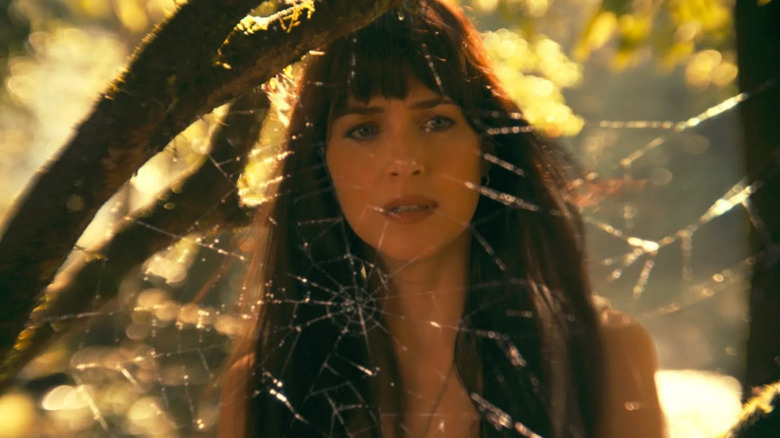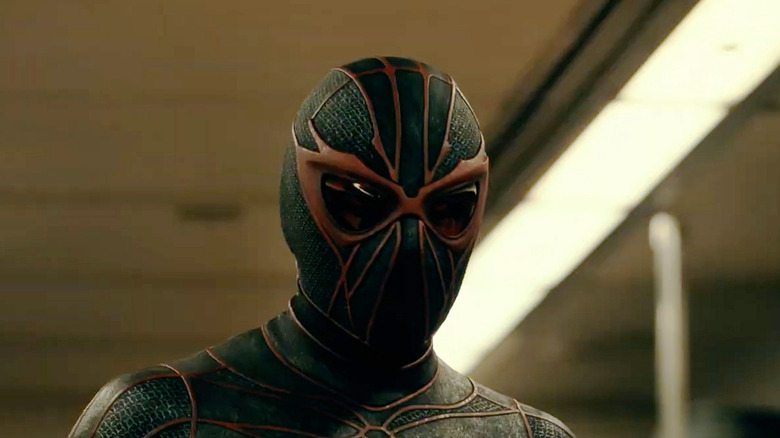Madame Web Ending Explained: The Spider-Future Is Spider-Female
Warning: this article will contain spoilers for "Madame Web"
One might hesitate to refer to S.J. Clarkson's new film "Madame Web" as a superhero movie. There is very little in the way of costumed vigilantism, and the only time the four central Spider-Women are seen in full superheroine regalia, making any use of their superpowers, they are merely glimpsed in flash-forwards. Indeed, audiences are never told how three of the four Spider-Women even get their powers; we're merely assured that they will be superheroes someday. It's a pre-origin-story origin story.
The only other spandex-clad fighter we meet is Ezekiel Sims (Tahar Rahim), the film's villain. Just like in Peter Parker's and Miles Morales' origin stories, Ezekiel also gained superpowers from a specialized spider bite back in 1973, giving him wall-crawling abilities, super strength, and a powerful Spider-Sense. In "Madame Web," Ezekiel's Spider-Sense isn't just a tingle to warn him of danger. This time around, it lets him look far into the future. For decades, Ezekiel has been plagued by visions of his own death at the hands of three mysterious Spider-Women. He has made it his life goal to identify them, hunt them down, and kill them.
It seems, however, that with great power comes great villainy for Ezekiel, and he has no compunction about killing people to achieve his means. He has looked into the future and seen that he will be killed and replaced by three more powerful, more capable, more heroic young women.
And this, it seems, is what "Madame Web" seems to be about. A bitter aging man, riding a legacy that began in the 1970s, fighting desperately to keep women from supplanting him. Subtly, "Madame Web" is about the future being female.
Damn the (Spider-)Man
The same spiders that gave Ezekiel his powers were also given to Cassandra Webb's mother, right as she was giving birth. The magical spider venom didn't save Cassandra's mom, but Cassandra discovers in 2003 — now working as an ambulance driver in Queens and played by Dakota Johnson — that she has ultra-sharp clairvoyance powers. Those powers lead Cassandra into the company of three seemingly random teenagers: the shy Julia (Sydney Sweeney), the flippant Mattie (Celeste O'Connor), and the intellectual Anya (Isabela Merced). In the future, Cassandra sees, these three will grow up to be costumed Spider-Women, but for now, they are mere teens, each one looking for a mother figure in their lives.
All four of the main characters, we learn, have been orphaned or abandoned or are merely neglected by their parents. When they go on the lam, fleeing from Ezekiel, they bond over their mutual love of Britney Spears and Cassandra's ability to teach them CPR. They converse and share their past traumas. They become three found sisters, cared for by their new reluctant mother. They become a sorority. Ezekiel is a bitter, lonely man. The four Spider-Women are a sisterhood who are stronger together.
One can almost sense that Ezekiel resents the growing power of the Spider-Women. His goal is to murder Julia, Mattie, and Anya before they can take their rightful place in the superhero canon. It's easy to draw a parallel between Ezekiel's goal and some of the whiny online discourse to grow out of the darker corners of comic book fandom. One needn't look too hard on YouTube to find crybaby male critics bleating incoherently about the injustice born by the mere presence of women in comic book movies. Reject women, they whine, before they can rise to power.
The ending
Julia, Mattie, Anya, and Cassandra manage to elude Ezekiel for the bulk of the film, but his 2003-era tracking equipment has him closing in. Eventually, they all meet at an abandoned fireworks factory (yes, seriously) to have a final showdown. Cassandra, having sharpened her clairvoyant powers in the Amazon, can now predict tiny elements of peril and is able to protect her three wards from explosions and flying shrapnel. Like a good mom, she can see a good future for her girls, and wants to raise them to the best of their potential. She even learns to trilocate, being able to project herself into multiple locations at the same time. What trilocation has to do with clairvoyance is never adequately explained.
In the conflagration, however, Cassandra is injured and blinded. The film ends with a new family dynamic. Cassandra, blindfolded and in a wheelchair, but now bursting with eerie psychic powers, has moved into an apartment with her three Spider-Daughters, serving as a matron, a team leader, and a mother. She loves her girls and the future they represent. The film ends with what might serve as a sequel tease, with flashes-forward to all four characters in their colorful superhero costumes, fighting crime, and being noble. Young women, "Madame Web" seems to say, are going to inherit the Earth. The only thing standing in their way are bitter old Spider-Men concerned with their mortality.
"Madame Web" is about potential energy. It's about how the future ultimately looks bright. The trauma of our past pushes us into the strength of our present and, ultimately, into the heroism of our future. And we can see it coming. Clarkson's film is shoddy and weirdly written, but its message is clear: the Spider-Future is Spider-Female.


